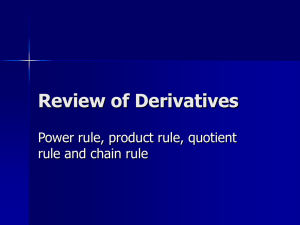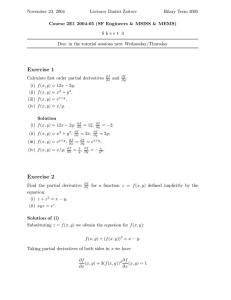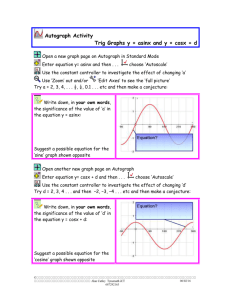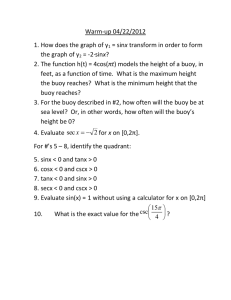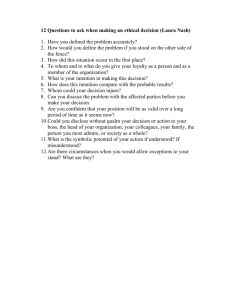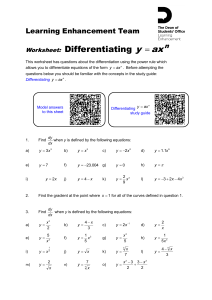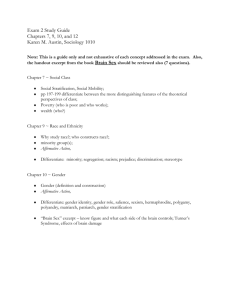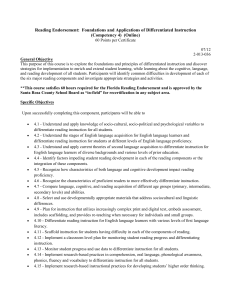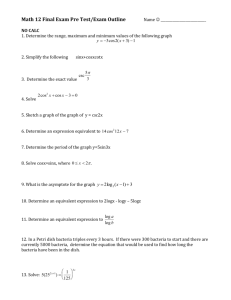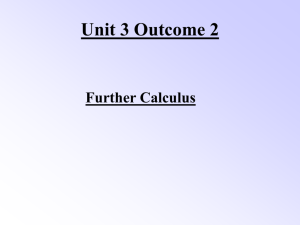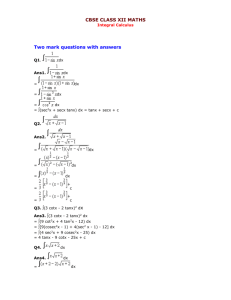Higher Maths: Differentiation & Integration Scheme of Work
advertisement
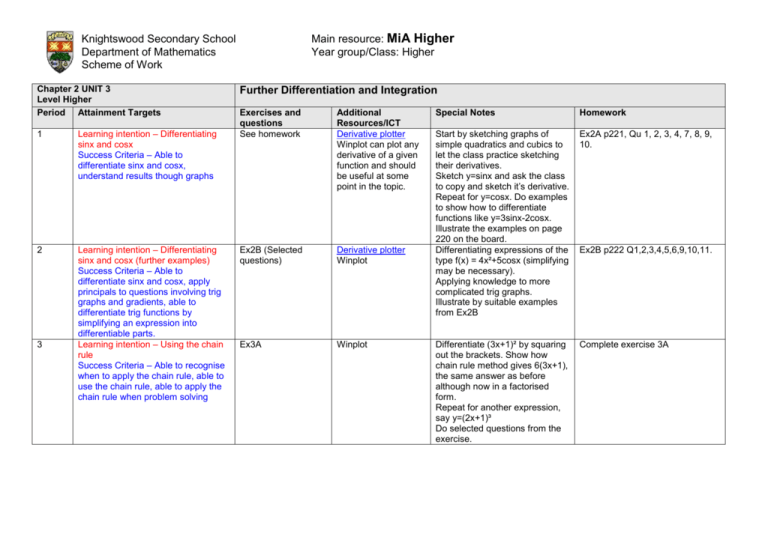
Main resource: MiA Higher Year group/Class: Higher Knightswood Secondary School Department of Mathematics Scheme of Work Chapter 2 UNIT 3 Level Higher Period Attainment Targets 1 Learning intention – Differentiating sinx and cosx Success Criteria – Able to differentiate sinx and cosx, understand results though graphs 2 Learning intention – Differentiating sinx and cosx (further examples) Success Criteria – Able to differentiate sinx and cosx, apply principals to questions involving trig graphs and gradients, able to differentiate trig functions by simplifying an expression into differentiable parts. Learning intention – Using the chain rule Success Criteria – Able to recognise when to apply the chain rule, able to use the chain rule, able to apply the chain rule when problem solving 3 Further Differentiation and Integration Exercises and questions See homework Additional Resources/ICT Derivative plotter Winplot can plot any derivative of a given function and should be useful at some point in the topic. Ex2B (Selected questions) Derivative plotter Winplot Ex3A Winplot Special Notes Homework Start by sketching graphs of simple quadratics and cubics to let the class practice sketching their derivatives. Sketch y=sinx and ask the class to copy and sketch it’s derivative. Repeat for y=cosx. Do examples to show how to differentiate functions like y=3sinx-2cosx. Illustrate the examples on page 220 on the board. Differentiating expressions of the type f(x) = 4x²+5cosx (simplifying may be necessary). Applying knowledge to more complicated trig graphs. Illustrate by suitable examples from Ex2B Ex2A p221, Qu 1, 2, 3, 4, 7, 8, 9, 10. Differentiate (3x+1)² by squaring out the brackets. Show how chain rule method gives 6(3x+1), the same answer as before although now in a factorised form. Repeat for another expression, say y=(2x+1)³ Do selected questions from the exercise. Complete exercise 3A Ex2B p222 Q1,2,3,4,5,6,9,10,11. Chapter 2 UNIT 3 Level Higher Period Attainment Targets 4 Learning intention – Further use of the chain rule Success Criteria – Able to apply the chain rule to more difficult examples Further Differentiation and Integration Exercises and questions Ex3B Additional Resources/ICT Special Notes Homework Be able to use the chain rule to differentiate examples of the type;- Comlete Ex3B to question 8 y 5 Learning intention – Chain rule and trig functions Success Criteria – Able to use the chain rule to differentiate functions of the form asin(bx+c) and acos(bx+c) Ex4A p227 Q1-8 6 Learning intention – More applications of the chain rule Success Criteria – Able to differentiate asin²bx and acos²bx, aware of substitutions which could help differentiate trigonometric functions. Ex4A p227 Q9-13 k (ax c)n Suitable examples should be illustrated on the board. Some considerable time will be spent giving a full solution to Ex3B Q8 (previous days homework). Once the chain rule is illustrated, questions 1-4 from the exercise can be done orally around the class. Questions should then be done agan in jotters as reinforcement and continued to Q8. Show how to change y=sin²x to y=(sinx)² before differentiating so that the chain rule can be easily applied. Do Q8b on the board by firstly differentiating the whole expression sin²u+cos²u. Explain the result using the fact that sin²u+cos²u=1 and illustrate with graph. Q12a is another good example to illustrate using the following 2 methods,1) y=2cos²x-1 (Abrv working) y = 2(cosx)²-1 dy/dx = -4cosxsinx = -2sin2x 2) y = 2cos²x-1 y = cos2x dy/dx = -2sin2x Ex4A p227 Q1-8 Complete Ex4A p227 Q9-13 Chapter 2 UNIT 3 Level Higher Period Attainment Targets 7 Learning intention – Integrating other functions Success Criteria – able to integrate expressions of the form (ax+b)n 8 and 9 Learning intention – Integrating trig functions Success Criteria – able to integrate expressions of the form sin(ax+b)+c and cos(ax+b)+c able to calculate simple definite trigonometric integrals 10 Consolidation 11 Consolidation Chapter 2 Level Higher Problem Solving in Learning and Teaching Evaluation of Topic Further Differentiation and Integration Exercises and questions Ex5 p229 Ex6 p230 Q1-11 Ex7 p232 Q1-10 Additional Resources/ICT Special Notes Homework Use the formula method. Pupils should be told to remember where the numbers go rather than by remembering the formula. The formula can be verified by the substitution method or the substitution method used as an alternative to the formula. Discuss what the integral of sinx and cosx must be by considering an integration as an antiderivative. Show appropriate examples which use the formula Complete the exercise. Ex6 P230 Q1-11 Ex7 p232 Q1-10 1 cos(ax b)dx a sin(ax b) Review p234 Q1-9 Review p234 Q10 - end (and similar for sin(ax+b)) Questions 1-5 of the exercise are suitable to be done orally around the class or with learning partners. Sample questions demonstrated on board. Sample questions demonstrated on board. Further Differentiation and Integration Review p234 Q1-9 Complete the review
